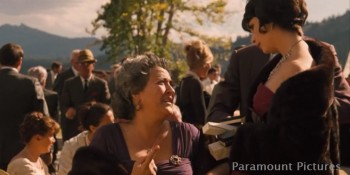This week on Curiata.com, many of our contributors are writing about Star Wars, given that Sunday was Star Wars Day. In honor of that spirit, I am going to examine, with A Feminist Sensibility, a topic at the nexus of cinema and feminism: the much-debated Bechdel test. For anyone who may be unfamiliar with the concept, the Bechdel test was created in 1985 by feminist cartoonist Alison Bechdel. She suggested a rating system for movies based on the following criteria:
- Is there more than one named woman in the film?
- Do the women talk to each other?
- Is the conversation about something other than men (or one specific man)?
It’s easy to see how Star Wars — and many other classic films — can come under fire if the Bechdel test is the sole criteria for measuring the worth, feminist or otherwise, of a movie. At least, it seems Star Wars would come under fire based on the comments at bechdeltest.com. I don’t know for sure because, you see, I have a confession: I have never seen Star Wars. Well, I’ve never seen Episodes IV, V, and VI, but I have seen the prequel trilogy
. I’ll give all of the Star Wars purists a chance to clutch their pearls and head over to Kevin’s article to tell him how wrong he is about the prequels.
Despite not having viewed the original films, most of the plot, characters, and controversies of the movies have pervaded mainstream culture and media. There are volumes written about the sexual portrayal of Princess Leia and the fact that she is the only female main character. And as I’m not personally knowledgable about the failings of Star Wars in terms of the Bechdel test, I’ll leave it to the folks over at Bitch Flicks, who already did a great breakdown of women in the Star Wars franchise.
Instead, I’ll talk about the Bechdel test in general and its effects on how we view and value films. Fans of Curiata.com will note that we take our movies seriously. All one has to do is check out our reviews from the Academy Awards, the 2014 Tribeca Film Festival, or even this week’s Star Wars coverage to see that is true. In my cinematic experience, I have discovered that there are amazing cinematic works out there that fail the Bechdel test miserably, and there are truly awful films that pass with flying colors.
A few weeks ago, our local cinema showed The Godfather on the big screen. This was my first time viewing the film in its entirety, and I was blown away. The Godfather is a true piece of cinematic art that is still amazing and beautiful to this day. The only thing The Godfather fails at is the Bechdel test.
Yes, there are several named female characters (Kay Adams, Connie and Carmela Corleone, Apollonia), but not once in three hours do they share conversation in a scene. Not only does it miss the mark on the critical Bechdel test questions, but the closing scene where Michael Corleone is conducting business and the door closes in Kay’s face made my feminist blood boil! I came out of the film both angry and awed; I declared it amazing, despite its chauvinistic tones.
(Note from the editor: The aforementioned scene sets up The Godfather: Part II, where the Michael/Kay tension is dealt with head-on. Incidentally, the featured image on this page is from the scene in The Godfather: Part II that allows that film, unlike the first installment, to pass the Bechdel test.)
Conversely, all five films in the Twilight saga pass the Bechdel test. I’m not trying to pick a fight with the Twihards, but I think we can all admit that no one came out of Twilight thinking, “Wow, that film really pushed the art of cinema forward.”
As an aside, I feel compelled to mention that I’m not arguing all modern-day blockbusters are terrible films. I’m planning to see a midnight premiere showing of X-Men: Days of Future Past. I realize that even though it is likely I will enjoy the movie immensely, I doubt I will come out of the theater with the same zen cinema-as-art feeling as I did after The Godfather. I’m also interested to see if Days of Future Past, with strong females including Mystique, Storm, Rogue, and Kitty Pryde, can match or exceed the Bechdel test success of previous X-Men films.
The point I’m making is that the Bechdel test is but one method of measurement. It does not inherently determine whether a feminist will find a film worthwhile. As a matter of fact, films that are, at their core, anti-feminist, like The Godfather, can give a feminist like me great enjoyment while reaffirming my dedication to the equality of women.
The Bechdel test gives us a place to start the conversation about the role of women in Hollywood. Are women under-represented in Tinseltown? Absolutely. According to a study by the San Diego-based Center for the Study of Women in Television and Film, women account for just 30 percent of all characters and a paltry 15 percent of the protagonists of the top 100 U.S. films in 2013. Not only that, but the same report found that women were less likely to be portrayed in leadership roles.
These are all issues that need to be discussed and corrected. The Bechdel test gives us an easily digestible, buzz-worthy platform to discuss these inequities. But the judgment of a film’s pro-feminism or its cinematic quality must be made by an audience tuned in to more in-depth criticism than the Bechdel test offers.
